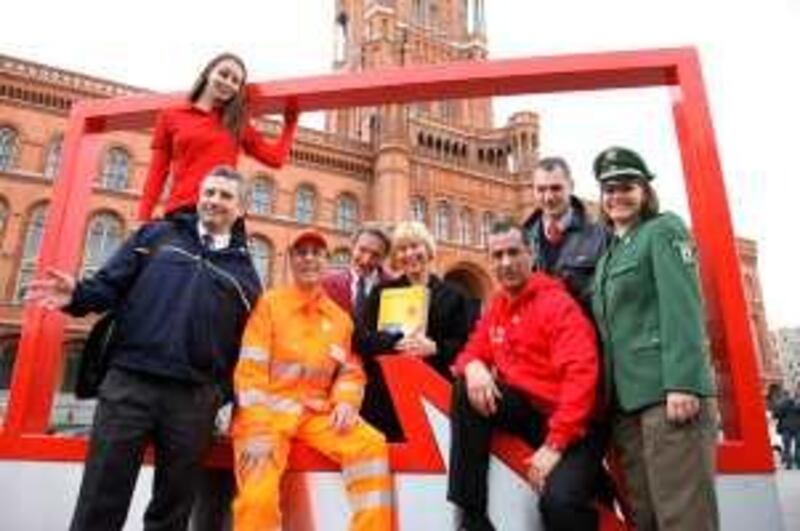BERLIN // Berlin has mastered many challenges in its chequered history, but its latest venture seems doomed to fail - it plans to teach its inhabitants to be friendly. The city launched a campaign last week to persuade bus and tram drivers, shop assistants and police officers to change the habits of a lifetime and pledge to be polite and helpful to visitors, and even to smile at them.
Thirteen service organisations, including the public transport company, the airports, the taxi drivers' agency and retail associations, signed a landmark co-operation agreement at Berlin's town hall. About 1,000 police officers, 2,000 train staff and 150 street sweepers have volunteered to wear a special badge that identifies them as friendly and willing to help. Their tasks include handing out maps and readily providing information to tourists.
The hope is that the behaviour of these trailblazers will rub off on the rest of the city's population, which is renowned in Germany for being gruff, to put it politely. The problem is that Berliners pride themselves on their "Berliner Schnauze" or "Berlin Snout", a blunt directness that they regard as witty and charmingly down-to-earth, but which strangers tend to find bafflingly rude. For example, there is the all too typical case of the man from out of town who boards a bus, offers a friendly "Good Day" and is then asked by the bus driver if he is kidding.
Then there is the Berlin police chief, Dieter Glietsch, who managed little more than a feeble grin during a photo opportunity for media at the launch of the friendliness campaign last week. Asked why he was not smiling much, he gave a textbook Berlin Snout response: "I've got so many friendly colleagues, I don't need to smile myself." Shopkeepers and restaurant staff are equally famous for their lack of charm. Examples include the waitress who tells you to hurry up and pay because she has other customers to serve: or who asks a mother to find somewhere else to drink coffee because her baby is too loud.
"Berliners lag behind a little when it comes to friendliness," said Rene Gurka, the head of Berlin Partner GmbH, the promotion agency that devised the ?200,000 (Dh948,000) scheme, which includes a publicity drive backed by billboards and postcards. To many visitors, Mr Gurka is putting it mildly. Hold a door open for someone, and you will wait in vain for a "thank you". Instead, 10 Berliners will pile in as if you open doors for a living.
If you ask for an item in a shop and it is not in stock, the standard answer is "We don't have it". Do not bother waiting for additional information, because it will not be forthcoming. Germany as a whole is not famous for its service culture. So if even German visitors complain about the rudeness of Berliners - and they do - you know that the capital has a problem. There is something intrinsically German about ordering people to be friendly, and Berliners have responded with a collective grunt.
"You can't be friendly at the push of a button," said Peter Wyzlitz, 58, a bus driver. "It comes from an inner attitude and we have our Berlin Snout. The authorities won't change that." Berliner Zeitung, a major Berlin daily newspaper, also has its doubts. "It's strikingly naive of the city to assume that friendliness and helpfulness can simply be ordered from above." Die Welt, a national newspaper, wrote: "The campaign is of course doomed to fail. It's easier to milk an ox than to convert Berliners."
The city launched a similar drive in 2006 before the football World Cup in Germany, when it posted hundreds of billboards around the city encouraging Berliners to smile at strangers and provided language training for public transport staff. That campaign fizzled out apart from one notable change - on local train platforms, when the doors of the trains are about to close, the guards no longer bark "Stand back!" They now bark "Stand back, please!"
Not all are opposed to the new campaign, though. "It's not a bad idea. People abroad are nicer than they are here," said Annette Hartmann, 68, a pensioner. The aim is to boost tourism. But Berlin does not have much to worry about in that regard, Snout or not. It is the third-biggest tourist destination in Europe behind London and Paris, and visitor numbers increased by four per cent in January despite the financial crisis.
The city also continues to attract artists from around the world for its lively cultural scene and because it remains a cheap place to live. Ceremonies to mark the 20th anniversary of the fall of the Berlin Wall are expected to boost visitor numbers this year. And tourists who tire of what Berlin calls the "rough heartiness" of its natives will be able to spot the friendly ones more easily now. They will be wearing a badge.
dcrossland@thenational.ae






